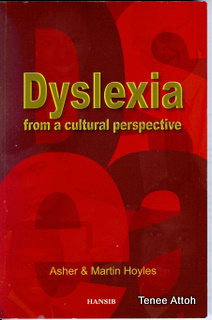This is a well written and easy reading book, which I would highly recommend to parents, Senior Management Teams in all schools (with the SENCO (Special Educational Needs Co-ordinator) being the obvious choice but NOT the only choice) and most importantly Local Governments where the ongoing battle for schools is to gain funding to support their dyslexic pupils; in many local governments dyslexia is, astonishingly, not considered to be a ‘special need’.
‘Dyslexia from a Cultural Perspective’ begins with a look at quantitative data regarding the disability which is thought-provoking in itself. For example, 40% of prisoners in the UK are dyslexic. Does this mean that we, as a society, have pigeon-holed people at an early age as illiterate or badly-behaved whilst being informed of the conditions of dyslexia? How can we prevent this from happening in the future? Are teachers solely responsible or can parents help? There are a multitude of questions to be answered.
I would like to point out that this book is not directly aimed at banging any political drum. It is a very educationally enlightening insight into dyslexia as a condition and highlights the frustrations and barriers that many people with dyslexia has to endure; things that most “normal” people take for granted. In a society where, generally, ethnic minorities are too often stereotyped this book certainly is an eye-opener but not only in the way the title may suggest to some. ‘Dyslexia from a Cultural Perspective’ not only looks at how dyslexia reinforces the stereotype of some cultures (e.g. low achieving (dyslexic) Black boys who are encouraged to excel in sports) but Asher and Martin Hoyles publication looks closely and intimately at how cultures view dyslexia as a condition, which I found particularly fascinating (e.g. on page 136 it states ‘the Chinese Government has introduced the word ‘canji’ (tsan-jee) which a neutral word for impairments. They have also invented a new slogan ‘canji erbu canfei’ meaning ‘disabled but not useless’’).
 ‘Dyslexia from a Cultural Perspective’ is a fantastic book, a must read for people from all walks of life and a very pleasant read. It is a book which combines cultural perspectives of the disability and the individual’s standpoint (including Asher Hoyles’, which was a deep and heartfelt account of her challenges). I would recommend this book to anybody and it will be a must on the Rollins’ bookshelf.
‘Dyslexia from a Cultural Perspective’ is a fantastic book, a must read for people from all walks of life and a very pleasant read. It is a book which combines cultural perspectives of the disability and the individual’s standpoint (including Asher Hoyles’, which was a deep and heartfelt account of her challenges). I would recommend this book to anybody and it will be a must on the Rollins’ bookshelf.
Reviewed by Adrian Rollins
Click here for book information
Click here for order form
Click here to contact us